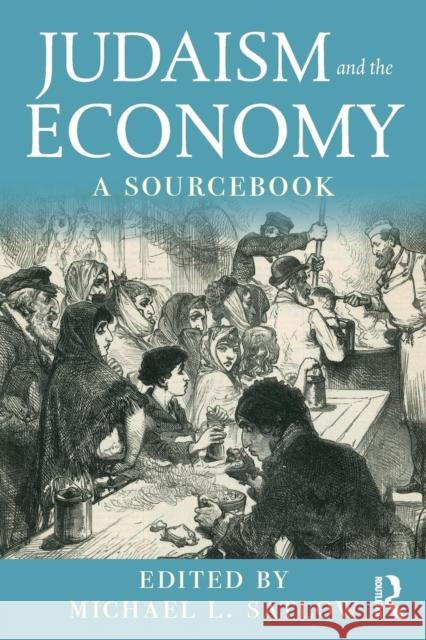Judaism and the Economy: A Sourcebook » książka



Judaism and the Economy: A Sourcebook
ISBN-13: 9780815353232 / Angielski / Miękka / 2018 / 212 str.
Judaism and the Economy: A Sourcebook
ISBN-13: 9780815353232 / Angielski / Miękka / 2018 / 212 str.
(netto: 190,81 VAT: 5%)
Najniższa cena z 30 dni: 181,29
ok. 16-18 dni roboczych.
Darmowa dostawa!
Judaism and the Economy is an edited collection of sixty-nine Jewish texts relating to economic issues such as wealth, poverty, inequality, charity, and the charging of interest.
List of Contributors; Introduction, Michael Satlow; Section A: Ancient Sources; Introduction to the Ancient Sources; 1. Responsibilities of the Bailee (Exodus 22:6-7); 2. Lending to the Poor (Exodus 22:24-26); 3. Sabbatical and Jubilee Years (Leviticus 25); 4. Tithes (Deuteronomy 14:22-29); 5. Sabbatical Year (Deuteronomy 15:1-11); 6. Righteousness and Redemption (Proverbs 10:2, 19:7); 7. Debt and Egalitarianism (Nehemiah 5); 8. Advice on Dealing with Money (Ben Sira 29); 9. Do Not Steal (Philo, On the Decalogue, 135-137); 10. A Treasury in Heaven (Matthew 6:19-33); 11. The Problem with Wealth (Matthew 19:23-26); 12. Taxes and Religion (Matthew 22:15-22); 13. God and the Poor (Matthew 25:31-46); 14. Collecting for the Poor (2 Corinthians 9); 15. Laws of Forgotten Sheaths (Mishnah Peah 6:5-7); 16. Who is Poor? (Mishah Peah 8:8-9); 17. Economic Speculation and the Sacred (Mishnah Sukkah 3:4; Babylonian Talmud Sukkah 34b); 18. Regulating the Market (Mishnah Baba Metzia 4:12); 19. Avoiding the Cancellation of Loans (Mishnah Shevi’it, 10:3-4); 20. Usury (Mishah Baba Metzia 5:1); 21. Risk and Liability (Mishnah Baba Metzia 7:8); 22. Market Intervention and the Common Good (Mishnah Keritot 1:7); 23. Laws of Inheritance (Mishnah Baba Batra 8:5-7); 24. The Economic Relationship between Spouses (Mishnah Ketubot 5:9); 25. Receiving Charity (Tosefta Peah 4:10); 26. Usury (Tosefta Baba Metzia 6:17); 27. Usury and Poverty (Mekhilta de-Rabbi Shimon bar Yohai, on Exodus 22:24); 28. Causes of Poverty (Sifre Zuta Deuteronomy 15:11); 29. Wealth and Worthiness (Jerusalem Talmud Berakhot 9:1, 13b); 30. Torah Study and Poverty (Jerusalem Talmud Peah 8:8, 21a-b); 31. Wealth and the Divine (Jerusalem Talmud Peah 4:3, 18b); 32. Market Intervention and the Common Good (Babylonian Talmud Pesachim 30a); 33. The Requirement to Give Charity (Babylonian Talmud Baba Batra 9a-b); 34. Poverty and Punishment (Babylonian Talmud Baba Batra 10a); 35. Wealth and Divine Favor (Babylonian Talmud Nedarim 38a); 36. Usury and the Poor (Exodus Rabbah 26); Section B: Medieval; Introduction to the Medieval Sources; 1. Limitations on Property Ownership (Rashi on Leviticus 25); 2. Lending to Non-Jews with Interest (Sefer Or Zarua Part III Bava Metzia § 208); 3. Risk and Reward, Profit and Liability (Maimonides Mishneh Torah, Laws of Agents and Partners 2:2, 4; 5:1, 2); 4. Wealth and Prophecy (Maimonides, Guide to the Perplexed II:32); 5. Charity and the Cosmos (Moses de León, Unnamed Composition); 6. Almsgiving and the Kabbalah (Moses de León, selection from Sefer ha-Rimmon); 7. In Praise of Poverty (Zohar III:223a Parashat Pinḥas, Ra’aya Meheimna); 8. Obligations to the Poor and the Shekhina (Zohar III:273, Parashat Eqev, Ra’aya Meheimna); 9. The Problem of Wealth (The Hebrew Writings of the Author of Tiqqunei Zohar and Ra’aya Mehemna); 10. Poverty and Prayer (The Hebrew Writings of the Author of Tiqqunei Zohar and Ra’aya Mehemna); 11. Principles of Almsgiving (Sefer ha-Hinnukh §. 449); 12. Private Property in the Synagogue (R. Isaac bar Sheshet Perfet, Responsum 253); 13. Almsgiving and the Public Order (R. Joseph Karo); Section C: Modern Period; Introduction to the Modern Sources; 1. The Inevitability of Poverty (Keli Yakar on Exodus 22:24-26; 2. "Workfare" (Keli Yakar on Exodus 23:5); 3. A Plea for Jewish Toleration (Simone Luzzatto, Discourse on the Jews of Venice); 4. A Plea for Jews’ Economic Integration into Britain (John Toland, Reasons for Naturalizing the Jews); 5. A Limit on Charity Contributions? (Joseph Emden, Responsa I 3); 6. An Obsession with Wealth (Rabbi Nachman from Breslov, "The Tale of the Master of Prayer"); 7. Richness and Torah (Rabbi Nachman of Breslov, Likutey Moharan 60); 8. Charity and Salvation (Hayim David Hazan, Sermon in Izmir); 9. Anti-Mammonism in Ante-Bellum America (Isaac Mayer Wise, "The Age and its Corruption"); 10. Scholars and the Communal Tax (Eliyahu Bechor Hazan, Responsum); 11. Slavery (Harriet Beecher Stowe, and Isaac Meir Dik. Di Shklaveray); 12. Priority for the Distribution of Charity (Yechiel Michael Epstein, Aruk Ha-Shulchan); 13. Poverty and Laziness (Mendele Mokher Sefarim (S. J. Abramowitz), Sefer HaKabzanim); 14. Poverty and the Religious Life (Rav Zadok ha-Kohen of Lublin, Machashavot Charutz); 15. The Poor Person and the Self (Hermann Cohen, selection from Begriffe der Religion); 16. Democracy and Dues (President’s Message, Congregation Adath Israel); 17. The Working Class (Michael Gold, "The East Side I Knew"); 18.Middle Class in America (Rabbi Edgar Siskin, "Do You Live According to Your Means?"); 19. Is Wealth Compatible with Spirituality? (Lucy Dawidowicz, "Middle Class Judaism"); 20. A Bill to Allow Banking (Heter Isqa); Bibliography; Index
Michael L. Satlow received his PhD in Ancient Judaism at the Jewish Theological Seminary of America and is Professor of Religious Studies and Judaic Studies at Brown University, USA. His research focuses on the social and religious history of Jews in antiquity. His most recent book is How the Bible Became Holy (2014). He has held fellowships from the John Simon Guggenheim Memorial Foundation and the American Council of Learned Societies among others.
1997-2026 DolnySlask.com Agencja Internetowa
KrainaKsiazek.PL - Księgarnia Internetowa









